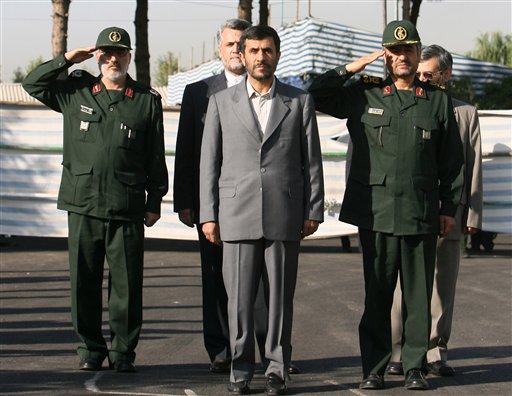Elliott Abrams argues President Obama should seek a formal authorization for the use of force from Congress against Iran and its nuclear program, in a Weekly Standard piece published this week.
Abrams, a senior fellow for Middle Eastern Studies at the Council on Foreign Relations, writes the Israelis do not believe the United States will use military action to prevent Iran from acquiring nuclear weapons, but an effort to procure the military authorization would be an "unmistakable message to the ayatollahs":
Such a proposal by President Obama would be controversial, and many Democrats would vote against him. (There is precedent for this: In the 1991 Gulf resolution, 45 Democrats in the Senate voted against the resolution and only 10 voted for it, and it passed only 52-47; in the House 86 Democrats voted yes and 179 voted no.) But it would, in the phrase Mr. Obama likes to use, be a teachable moment. First, the very presentation of such a resolution by the White House would show a new level of clarity and commitment. This would be likely to affect both Iranian and Israeli calculations far more than statements like "all options are on the table."
Second, should such a resolution fail, everyone would be clear that the United States was not going to act and that Israel need delay no longer so as to leave it to us. Third, a clear statement from the president that he intended to use military force if necessary would almost certainly be backed by the Republican candidate, Mitt Romney, producing rare election year unanimity on a national security issue. That too would likely change Israeli and Iranian views of the chances the Americans would act. Fourth, seeking such a Joint Resolution now would be a useful acknowledgement by the United States that we do not have perfect knowledge of when, as Iran advances toward a bomb, a military strike might be needed—so we will start getting ready now.
Those who believe that a negotiated deal with Iran is still theoretically possible should welcome this congressional expression of intent. The Iranian regime still believes it can get nuclear weapons and is not negotiating in good faith. Only if it is persuaded that it will never get those weapons—that the choice is between a negotiated agreement and an American military strike—is a deal possible. Similarly, those who oppose an Israeli strike must realize that the best way to avoid it is to persuade Israelis that by deferring their own action they are not accepting an Iranian bomb but accepting that the world’s most powerful nation will deal more effectively with Iran than they will.
